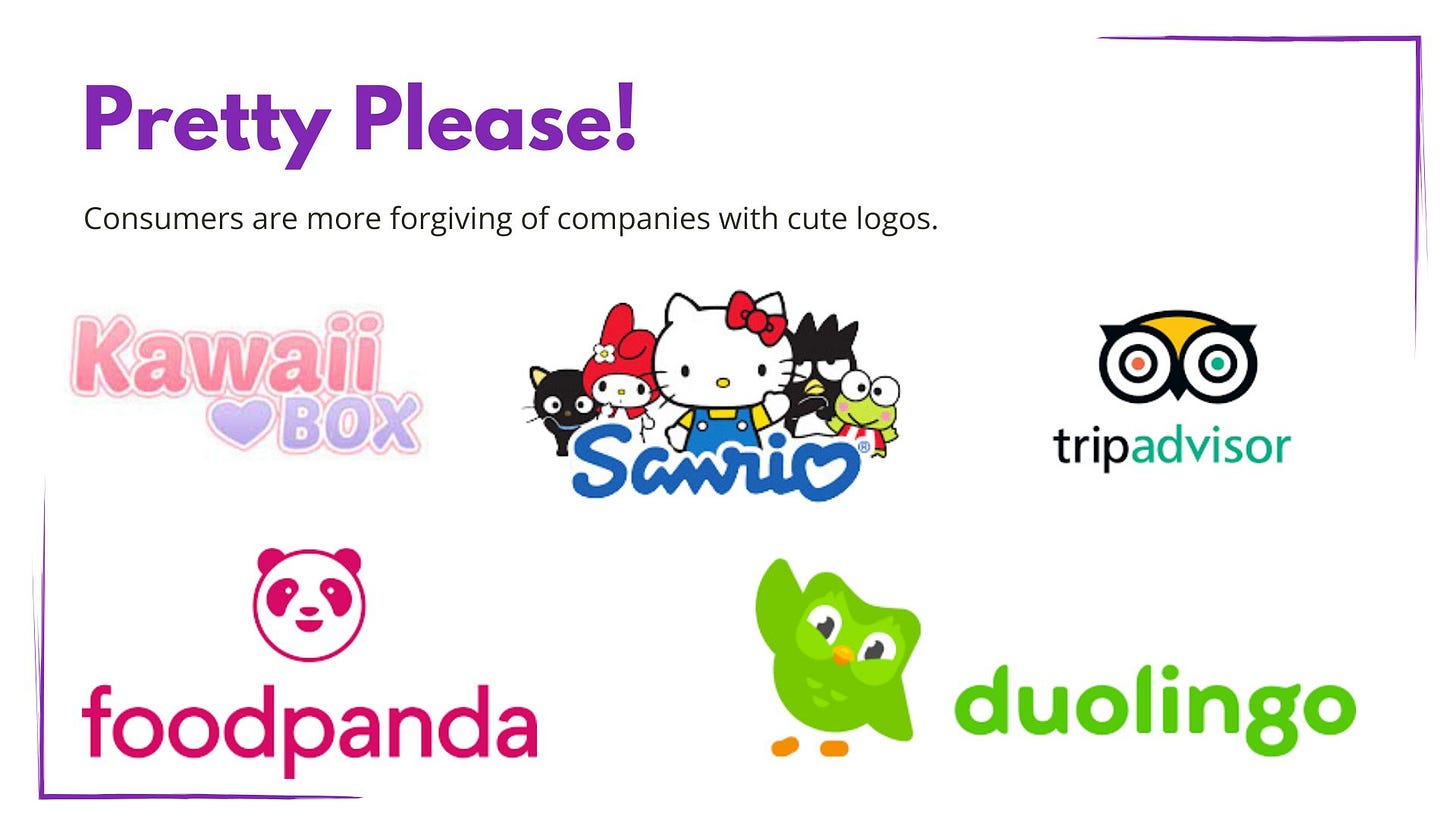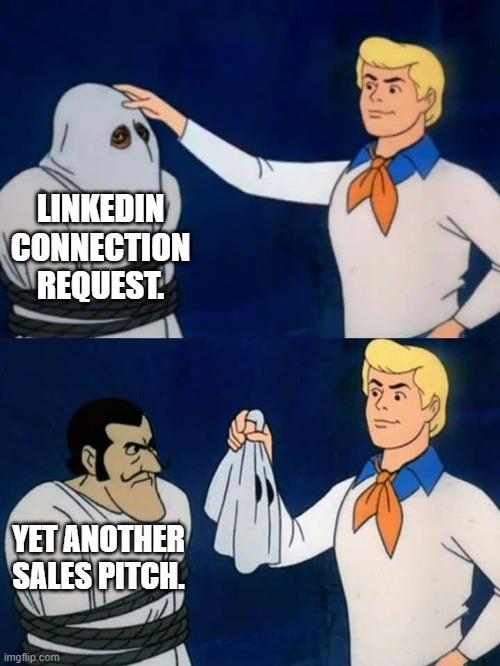MarketingDojo #31: Too cute to cancel 🐼🐱🐨
The halo effect of cute logos, Headspace's content-led growth, Under Armour's Gen AI ad and more.
Hello Ladies & Gentlemen,
Happy Independence Day to my friends in India! I hope you're having a fantastic long weekend - I'm a bit jealous but mostly happy for you!
Don't miss out on the P.S. section for a fantastic podcast recommendation during your downtime.
Today, I've got some interesting articles lined up for you, including
🐻 Cute mascots have a hidden advantage
😍 Love it or hate it? Underarmour’s ChatGPT ad
🎲CNET tried to game search results
🧘♀️ How content marketing helps sell inner peace
And lots more.😎
The Power of Cuteness: How Adorable Logos Foster Forgiveness
Brands can spend millions of dollars on logo redesigns. For example, the Arnell Group charged $1 million to redesign the Pepsi logo in 2008, and Accenture's rebranding cost $100 million.
Logos are one of the most important elements of a brand's identity, helping customers remember and distinguish it from others.
Research published in the International Journal of Research in Marketing conducted five tests to unearth a surprising advantage of having cute logos.
The results showed that customers are more forgiving if a brand with a cute logo makes a mistake. The cuteness of the logo can motivate consumers to protect the brand from harm, thus mitigating the consumer's anger against something wrong done by the brand.
The reason? People feel a sense of caretaking and nurturing towards cute logos, which makes them less likely to punish the brand for something that went wrong.
So there you have it - Having a cute logo might be the insurance your brand needs to avoid getting cancelled by Gen Z!
It's too bad the folks over at X (also known as Twitter) didn't read this report before their rebrand. Oh well!
A Snoozefest Authored by AI.
Under Armour's latest ad, "The Ultimate Team Talk ", is an AI-generated attempt to create the most inspiring locker room speech.
UnderArmour collaborated with 6 prominent EU footballers to get their insights on what motivates them and their favourite motivational speeches. This information was fed into a large language model to create the ultimate team talk.
The result - an ad that could put you to sleep!
ChatGPT often creates needlessly long responses that we can shorten by at least 25%. Under Armour's ultimate team talk feels like one of those long boring answers.
It's great to see brands incorporating Generative AI into their creative process. As is true with all new tech - there will be hits and misses.
This one is a miss for me.
What do you feel?
Memetime: Dodging The Pitches.
It's an annoying phenomenon getting far too familiar these days - LinkedIn requests that are swiftly followed by a pitch request.
Social selling technically means building relationships with potential customers through social media platforms. But thanks to automation, bot armies & outsourcing - social selling is beginning to look a lot like spam.
This week's meme is dedicated to the pitch slapping disguised as connection requests.
Was this newsletter forwarded to you? If yes, consider subscribing. It’s quick & easy. I will deliver a newsletter with all the marketing goodness in your inbox every Wednesday.
Erasing the Past for a Better Future, CNET Style.
Tech publisher CNET tried to game Google's algorithm and got caught by eagle-eyed netizens.
CNET deleted thousands of articles to improve its Google search rankings. Google's SEO rankings are a bit of a mystery, but the algorithm anecdotally deprioritizes websites with old pages.
By removing older pages, CNET hoped to signal the freshness of its content to Google - this would boost its SEO rankings.
The controversy also caught Google's attention, and the company responded.
All said and done, CNET is a vast website, and a few thousand articles aren't a big deal. For better or for worse, brands often go for content pruning to provide an immediate boost to their SEO rankings. CNET, unfortunately, got caught playing the game.
Calmly Crafting Success: Headspace’s Content-Led Growth.
The meditation & mindfulness app Headspace is unique in many ways. Co-founded by a monk, the app pioneered making meditation accessible.
It created the category and remained a market leader as several competitor apps sprung up—one of its big moats is its well-thought-out content marketing strategy.
If you're interested, one of my favourite newsletters, How They Grow, did a deep dive into Headspace's growth strategy. It's a bit long, but worth the read!
One of the big pillars of growth for Headspace has been its content-led growth strategy.
In July, Headspace.com accounted for a total traffic of 2.1 Mn. Only 0.57% of the total traffic came via paid search. No dependence on paid ads or paid social!
So how has Headspace managed this? The How They Grow newsletter breaks it down into four broad reasons:
Using content to break into new serviceable market segments: Headspace creates content on various topics, including climate anxiety, to attract new users.
Embracing multiple content platforms: Headspace uses various platforms to connect with its audience. They are present on YouTube, TikTok, Facebook, Instagram, Twitter, and Snapchat and even have podcast shows.
Leveraging partnerships: Headspace's marketing team is a pro at tie-ups. They have partnered with Nike, Hyatt, Pinterest and even the dating app Hinge.
One great example is their partnership with Starbucks. Together, they offer Starbucks members a series of meditations to turn coffee routines into a mindful experience. Plus a free 60-day Headspace Plus trial.
The value of video: Headspace adopted an unmistakable visual style for its videos early on. The Sesame Street x Headspace videos have garnered over 2.9 million views on Youtube. Headspace's guide to meditation series on Netflix led to a 70% spike in sign-ups.
Headspace is a picture-perfect case study of how content-led growth can pay off (in the long term).
Short Stuff
Youtube is banning links from Shorts. (Too many crypto scams)
McDonald’s removes the mention of ESG from its pages. (Greenhushing in progress).
Inspired by its rival Uber, Lyft has launched new in-app ad formats. (Waiting for your ride? Watch an ad).
That’s all the marketing dope for the week. I hope you enjoyed reading the newsletter. If you learnt something new - please consider leaving a like or a comment. It helps drive the discoverability of the newsletter on the platform.
Substack has made it easier than ever to share the newsletter. Please consider sharing the newsletter with fellow marketers.
Once again - thank you for your time and attention. It means a lot.
Ciao,
Garima
P.S.: The folks at Planet Money always come up with the most engaging & knowledge-packed podcasts. Once more this year, I am hooked on the Planet Money Summer School. This year the team is conducting an MBA crash course full of real-world case studies, expert insights, and trademark humour.
If you're looking for something fun and informative to listen to during your commute or while running errands, I highly recommend trying the Planet Money Summer School. It's a great way to spend your time!










